At last! Winter has descended on our desert town. While there are joys to be had - like nearly an inch of rain that filled up all our cisterns - winter also brings with it some challenges.
I've learned (the hard way) that there are some preparations I need to make around our yard to be ready for the freeze. And there are some things that I am still learning - like what to do with the basil...
After the big rain this summer, our three moringa trees grew so big and had pods (drumsticks) for the first time. What a delight it was to see them flourish and to enjoy the bountiful harvest of leaves, small pods, and flowers! I will be so sad to see them go. From experience of winters past, I know that our moringa (in the right-of-way with nothing to protect them) die during the hard freeze. In fact, the whole trunk gets moldy inside. The good news is that that they usually come back again from the roots by the next spring. But I feel a bit more secure when I wrap some insulation piping around the bottom of the trunks. Here it is all tied up with string.
We had so many edible leaves this year, that we put out a call for people to glean some, but we still had plenty left.
The moringa were starting to lose their leaves in the cold. So I started pulling off the leafless branches and cutting them into small pieces to add to the decaying mulch. That's what Brad Lancaster calls "Chop and Drop." I just love free mulch!
The day after I got the insulation around the trunks, it started to pour. I knew it was supposed to freeze the next night (Saturday), so I rushed out into the storm and started harvesting some more of the nutrious leaves.
I also left some test branches to see if these larger trees could make it through a freeze and they did! I think it was because of the deep watering it got the day before.
Speaking of experimenting... After getting a variety of ideas on what to do with my basil before the freeze, I decided to try out a few of the suggestions.
I headed out to the garden to protect what I could of our basil.
I finally get to try this gardening cage.
I covered it with an old cloth. I heard it should reach all the way to the ground. I did my best.
Then I dug up one of the smaller basils and planted it in a hanging pot that I will keep in the house until after the freeze.
I ended up planting three basil plants in the soil that they were grown in. I watered them with rainwater from our cistern.
Someone suggested that I harvest it before the freeze. I harvested a whole bunch that were getting really tall and going to seed.
While I was harvesting it, I got a nice surprise. I uncovered a volunteer tomato plant!
I had done the same thing to protect some cilantro sprouts from the critters in our garden...
That night it rained. Which was great because it completely filled up our new cistern! Deep watering also helps protect plants from the freeze.*
I happily carried my basil bounty back to the house.
Can't wait to see how my little experiments turn out. In the meantime, we'll enjoy the harvest!
Starting with this tasty pesto!
Wishing you and yours an abundant New Year!
For the results of my little experiment check out:
Springing forward! How my cold-sensitive plants fared the freeze
For the results of my little experiment check out:
Springing forward! How my cold-sensitive plants fared the freeze
MORE INFORMATION
Why we put Styrofoam cups on cacti and other Tucson winter gardening tips
Tips for desert gardening in the winter - This Is Tucson
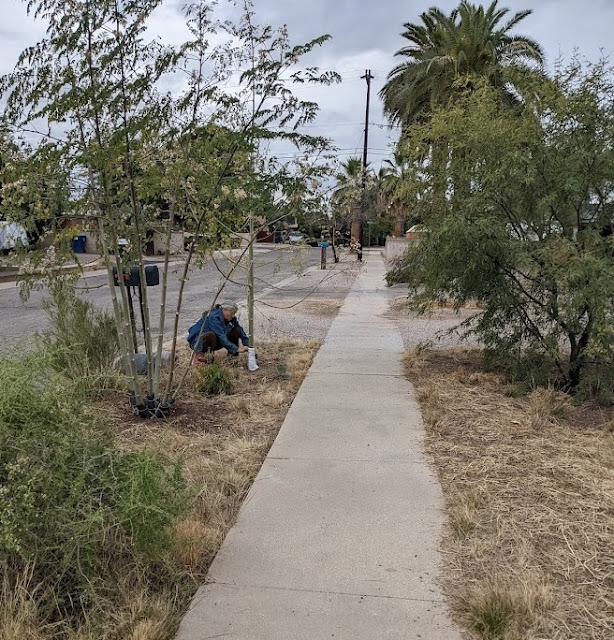

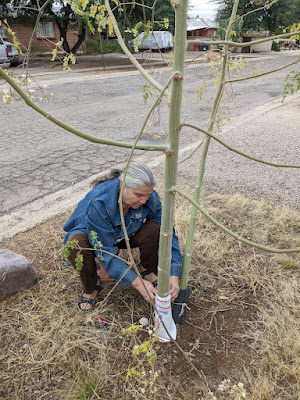
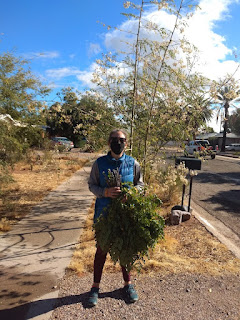

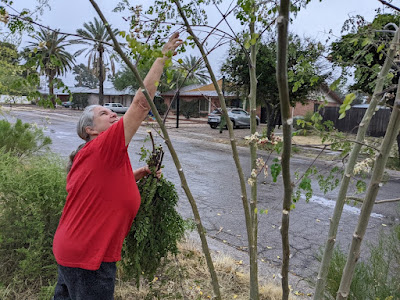

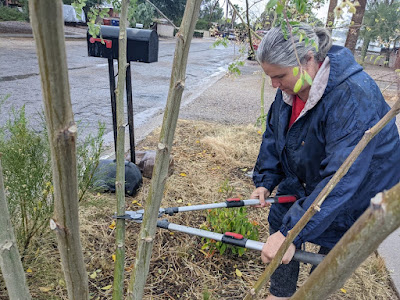
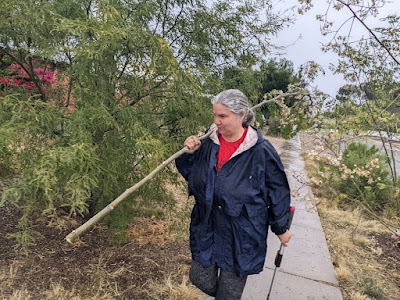



















Photo credit goes to my son, Jeremy Segal.
ReplyDeleteUPDATE:This morning (January 2, 2022) there was frost on the ground, but our moringa seemed to have made it so far! Maybe it was the rain we got the night before and the insulated piping I put around the trunk. I will check how it looks later.
ReplyDeleteUPDATE Jan. 2, 2022: It seems the basil that I left in the ground and covered by the cage survived as well.
ReplyDeleteDan harvested chiltepins just in time!
ReplyDeletethanks for the inspiration! love your tips!
ReplyDeleteUPDATE: After 2 nights of freezing 31 degree weather, the leaves and flowers on the moringa have died. The branches still seem to be intact.
ReplyDeleteThe basil replanted in my pot (inside the house), as well as the basil in the ground (even those left uncovered) are still alive! Yeah!
The volunteer tomato has two yellow leaves.